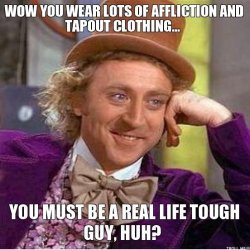Context, son. I didn't put them forwards as great, perfect, or even good examples… simply as two of the best known examples of people who do have an actual ninjutsu background (although RBWI really is it's own beast, when it comes down to it)… I know of a couple of Bujinkan members who have a semi-amateur involvement as well, but they're not easy to find any footage of. The point, though, was that most of what's identified as "ninjutsu" isn't.
No, it's not pompous, it's accurate. If someone said they were a Judo player, and did nothing but bad attempts at TKD leaping and spinning kicks, would it be pompous to say that he wasn't showing any Judo?
No, just that it is a specific thing, which was not seen anywhere in the clip provided.
He was being made fun of because he came in with a head full of fantasy, and because the only reference the guys there had was equally based in fantasy… so that's where they put him (mentally).
Eh, doesn't mean anything to me, frankly. If he wants to engage that way, go for it… but it's hardly something I'm going to be impressed by.
And? You're now saying that a top name in the sport beat a kid with a head full of delusions, and you're considering this… what? Impressive that someone who professionally trains for MMA beat a no-name kid? Not surprising because he trains professionally, and the kid was nobody? And I'm not sure what the reference to his (then) BJJ white belt has to do with anything, especially if he was already a fairly seasoned wrestler… and, if it didn't make any difference, then why was it important that the kid was claiming to be a ninjutsu practitioner? Obviously you're saying that the person matters (which is the case in sports systems, honestly) more than the system… I mean, MMA loses as much as it wins (each MMA match has an MMA competitor win, and an MMA competitor lose…

, so is the system really that good? I mean, you're as likely to lose with it as anything else…
What hocus pocus? What the hell are you talking about? You said that "fighting is fighting", I pointed out that it's not, as it's highly context-dependant, and gave examples of a range of different influences on exactly what constitutes a "fight" in a range of contexts… there was no "hocus pocus" at all… Oh, and you don't really want to play the "plenty of cops train MMA" route… that argument can be made for almost any system on the planet… Troy Wideman, the gent in the first clip I showed on the previous page, has been an LEO for decades, for example… the Bujinkan has many military, security, LEO members, as does almost any other art I could come up with.
But here's the thing… if an LEO used an MMA approach, he'd probably get suspended or fired… and if a soldier used it, he's probably already dead from the armaments of his opponent. Really not a good argument.
I'll reiterate… do you really think such things are unique to MMA? Cause, if you do, you really should do a bit more looking around… MMA is just a johnny-come-lately in all this, when all's said and done… many other systems have been doing it longer, harder, and far more seriously than you have a clue about.
Careful, son.
Who have I knocked out? Two students (within a week of each other), and two people in real life. And no, we don't spar… we do have a form of free-form training, and do a lot of scenario work, but the idea of trading blows/sports-style sparring is ineffective, counter-productive, and detrimental to our approach.
No, I didn't "brag", I mentioned it to demonstrate that MMA is not unique in the way you think it is… oh, and I don't have a "gym"…
The question was whether or not you thought that MMA was the only approach that "fought or sparred hard", not what you thought was the best (I think it's pretty obvious what you think is the best… I'd disagree, but it's just opinions at that point, and I have no need to change your mind… if you like it, great, if you get value, even better… but you really should realise that your opinion doesn't necessarily translate to fact). But again, you're still missing context… "champions" means absolutely nothing to me… it's artificial garbage, and nothing to do with martial arts (the way I approach them). If you want to win MMA matches, you need to train MMA… which is a particular training methodology, and is the best suited for that context… if you have other needs, then other approaches are better. That's what you're simply not getting.
"Heralded"? No. I just brought them up as more credible examples (when it comes to their background).
They have legitimate, credible backgrounds in what they claimed to have. You seriously had to ask that question?


